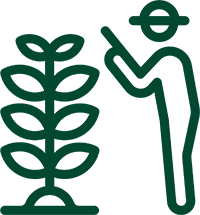Specializing in plant sciences allows students to cross the traditional boundaries that have separated genetics, plant physiology, molecular biology, and their application to crop production. By linking laboratory approaches and plant production systems through the application of plant biotechnology students learn to solve multi-disciplinary problems. Students can select courses that allow concentration on genetic engineering or whole plant physiology and plant breeding to address real-world problems.

Student Learning Objectives
Upon completing the BS in Tropical Agriculture and the Environment, students will be able to..

Demonstrate the ability to identify problems associated with agriculture, and apply the scientific method and practices to develop sustainable solutions from urban to rural environments.

Demonstrate the ability to critically evaluate scientific evidence, identify gaps in knowledge, and apply evidence-based arguments to solve issues associated with agriculture in a dynamic world.

Demonstrate responsible and ethical conduct, leadership, collaboration, respect for a diversity of viewpoints, and the capacity for life-long learning appropriate to professional and community-based practices.

Demonstrate understanding of the science of agriculture and its interaction with the environment from molecules to ecosystems.

Demonstrate proficiency in oral and written communication for both professional and general audiences.
Plant Sciences Advisor
Contact for assistance with course selection, career advising, or any curriculum inquiries.
Program Documents
General Education Requirements
Students must complete the UH Mānoa General Education Requirements, alternatives are available to the Hawaiian/Second Language requirement. An updated list of the courses recommended to satisfy the requirements is available from the undergraduate advisor. Courses at 200-level or above usually require prerequisites.
The TAE core course requirements:
- TPSS 200 (SUST 211) [DB] – Agriculture, Environment, and Society
- BIOL 265 [DB] – Ecology and Evolutionary Biology
- TPSS (NREM) 304 | 304 L (DP | DY) – Fundamentals of Soil Science / Fundamentals of Soil Science Lab
- NREM 310 – Statistics in Agriculture and Human Resources
- or HDFS 380 | 380 L – Research Methodology / Research Methodology Lab
- PEPS 421 [DB] – Foundations of Pest Management
- TPSS 470 – 470L (DY) – Plant Physiology / Plant Physiology Lab
- TPSS 492 – 492L or PEPS 495 – Internship or Capstone Project
- TPSS 499 – Directed Studies
‣ Students are required to complete 120 credits to graduate with a BS in TAE.
Requirements for the Specialization in Plant Sciences
Students selecting this option must complete the following courses:
- MATH 140 – Precalculus: Trigonometry and Analytic Geometry
- or NREM 203 – Applied Calculus for Management, Life Sciences, and Human Resources
- *BIOL 171 – 171L – Introduction to Biology / Introduction to Biology Lab
- and *BIOL 172 – 172L – Introduction to Biology II / Introduction to Biology II Lab
- *CHEM 161 – 161L – General Chemistry I / General Chemistry I Lab
- and *CHEM 162 – 162L – General Chemistry II / General Chemistry II Lab
*or their equivalent
Some of these courses will fulfill part of the Natural Science requirement of the UH Manoa General Education Requirement, and are considered prerequisite to some courses in the major.
Major Course Requirements
Students must take 10 courses (total 30 credits) as follows, course options can be found on the Bachelor Degree Program Sheet:
- Genetics and Physiology Courses [Group A]
- Students must take 3 courses (at least 12 credits) from a list of 6 courses
- Supporting Courses [Group B]
- Students must take 7 courses from a list of 24 courses
